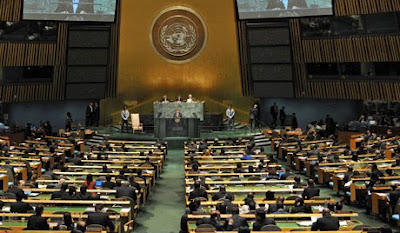

| Visitors Now: | |
| Total Visits: | |
| Total Stories: |
Syrian crisis: polarization of opinion
Ilya Kharlamov
The Westerns leaders making similar statements in New York is only natural given their permanent drive to rein in Damascus and Tehran and revise the current system of international relations in circumvention of the UN. Adding fuel to the fire was a statement by Sheikh Hamad bin Khalifa Al Thani, the ruling Emir of the State of Qatar, who called for mulling a military intervention in Syria, where he said a no-fly zone should be created. This is a very dangerous tendency, believes Igor Korotchenko, a Moscow-based political analyst.
“Qatar acts as an instigator of sorts,” Korotchenko says, referring to Qatar possessing hefty sums and local tribal leaders’ ambitions. “We know that Qatar sponsors a spate of negative changes that are taking place in Northern Africa, and that Qatar lends support to Syrian rebels. I think that the time is ripe for considering slapping sanctions on this gas dwarf,” Korotchenko says.
Western elites and their Middle Eastern partners are irked with the position taken by Moscow and Beijing, which have repeatedly blocked the UN Security Council’s resolutions on Syria. In an interview with the Voice of Russia broadcast on Thursday, Fyodor Lukyanov, editor-in-chief of the Russia in Global Affairs magazine, lambasted Western countries’ push for meddling in the Syrian conflict. He attributed this push to the West’s dissatisfaction with its own actions, Lukyanov said.
” The situation in Syria came to a standstill,” Lukyanov says, separately referring to the killing of a US Ambassador to Libya that recently hit the international headlines. “Some in the United States have already slammed Washington’s desire to interfere in the Syrian conflict that I think reflects the West’s inability to act,” Lukayanov says, singling out the West’ frustration about Bashar Assad still being in power in Syria.
For his part, Egyptian President Mohamed Morsi called the resolution of the Syrian problem one of his key priorities. He added that this would help Syria contain a threat of a foreign military intervention that he stressed is being opposed by Cairo. Morsi was echoed by Russian Foreign Minister Sergei Lavrov who said on Thursday that the Syrian crisis should only be resolved through a national consensus in a wide-scale inter-Syrian dialogue under the UN’s aegis. Lavrov was speaking during his meeting with UN-Arab League envoy Lakhdar Brahimi on the sidelines of the UN General Assembly
The
Intercept is a collection and transmission of data that offers
substantive contradictions, challenges and enlightenment over the
conventional drivel brought to us by corporate media.
2012-09-28 21:47:40
Source: http://weeklyintercept.blogspot.com/2012/09/syrian-crisis-polarization-of-opinion.html
Source:




